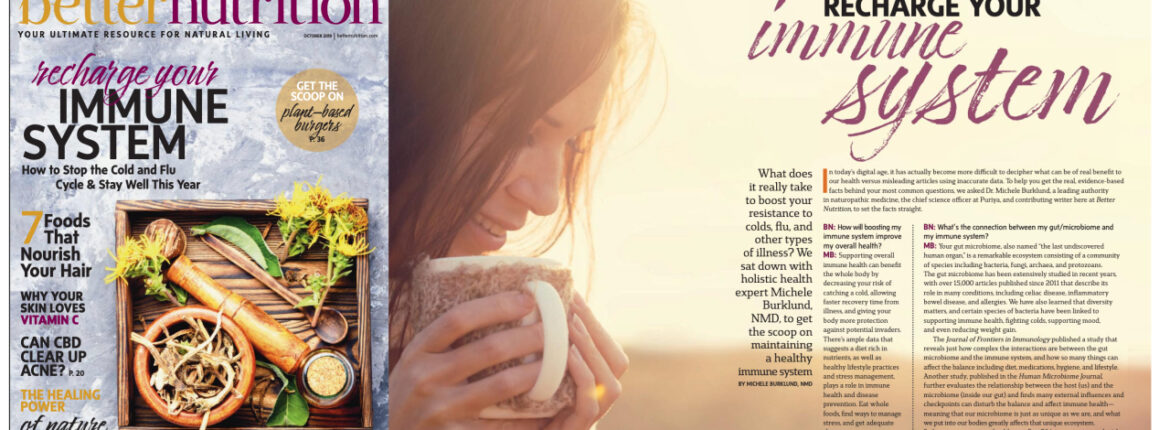

Check out the latest article our Chief Science Officer, Dr. Michele Burklund has written for Better Nutrition Magazine focused on Immune Health, Prevention, and The Healing Power of Nature…
“In today’s digital age, it has actually become more difficult to decipher what can be of real benefit to our health versus misleading articles using inaccurate data. To help you get the real, evidence-based facts behind your most common questions, we asked Dr. Michele Burklund, a leading authority in naturopathic medicine, the chief science officer at Puriya, and contributing writer here at Better Nutrition, to set the facts straight.
BN: How will boosting my immune system improve my overall health?
MB: Supporting overall immune health can benefit the whole body by decreasing your risk of catching a cold, allowing faster recovery time from illness, and giving your body more protection against potential invaders. There’s ample data that suggests a diet rich in nutrients, as well as healthy lifestyle practices and stress management, plays a role in immune health and disease prevention. Eat whole foods, find ways to manage stress, and get adequate sleep to encourage a balanced and harmonious immune function.
BN: What’s the connection between my gut/microbiome and my immune system?
MB: Your gut microbiome, also named “the last undiscovered human organ,” is a remarkable ecosystem consisting of a community of species including bacteria, fungi, archaea, and protozoans. The gut microbiome has been extensively studied in recent years, with over 15,000 articles published since 2011 that describe its role in many conditions, including celiac disease, inflammatory bowel disease, and allergies. We have also learned that diversity matters, and certain species of bacteria have been linked to
supporting immune health, fighting colds, supporting mood, and even reducing weight gain.
The Journal of Frontiers in Immunology published a study that reveals just how complex the interactions are between the gut microbiome and the immune system, and how so many things can affect the balance including diet, medications, hygiene, and lifestyle. Another study, published in the Human Microbiome Journal, further evaluates the relationship between the host (us) and the microbiome (inside our gut) and finds many external influences and checkpoints can disturb the balance and affect immune health—meaning that our microbiome is just as unique as we are, and what we put into our bodies greatly affects that unique ecosystem. So how can you restore healthy gut flora? It’s important to replenish your beneficial bacteria after antibiotic use by taking a probiotic and eating fermented foods. Keep your gut flora balanced and support your body’s immune function by eating prebiotic foods such as garlic, asparagus, leeks, onions, and Jerusalem artichokes.
BN: What are the best immune-booster supplements?
MB: There are countless supplements that can support the immune system, but these are a few of my favorites:
- Olive Leaf Extract: Extra-virgin olive oil gets all of the attention, but the leaves of the olive tree are just as medicinal, if not more! A recent study published in the Journal of Nutrients found that the use of olive leaf extract dramatically lowered the number of sick days in high-school athletes by 28 percent when compared to a group that didn’t supplement. Oleuropein is the main healing compound found in olive leaves that has been studied for its antibacterial, antiviral, antioxidant, and anti-inflammatory effects. Olive leaf extract is typically found in capsule or tincture form.
- Artemisia: Commonly known as wormwood, this powerful immune-supportive plant has a 5,000-year-long history in traditional Chinese medicine for effectively treating common conditions. The Journal of Clinical Infectious Diseases published a German study that revealed this potent herb to have a broad spectrum of antimicrobial activities against common viruses including Epstein-Barr and other viruses from the herpes family. Interestingly, recent research on Artemisia has also shown that it helps balance the gut microbiome and supports immune health. Try this bitter herb in tea, tincture, or capsule form.
- Medicinal Mushrooms: Found in forests around the world, healing fungi can have profound effects on your well-being. Biomedical Journal published a recent article about medicinal mushrooms that outlines more than 130 different medicinal functions, including immune balancing and detoxification actions, as well as the ability to ward off common viruses and bacteria. Beneficial mushroom species with powerful therapeutic properties include chaga, shiitake, turkey tail, reishi, maitake, lion’s mane, and cordyceps.
- Cat’s Claw Bark: It’s not as common as other immune-boosting botanicals you see in health food stores, but that’s no reason to dismiss it. Native to the Amazon, cat’s claw has been shown to be a powerful immune booster in traditional medicine. The Journal of Phytotherapy Research discovered that this rainforest remedy could have a beneficial influence on the immune system and can be used as a good preventive remedy. Not only can this bark decrease inflammation and support immune health, but it’s also been shown to improve brain health. In fact, the Journal of Scientific Reports concluded that cat’s claw could be a “potential breakthrough for the natural treatment of both normal brain aging and Alzheimer’s disease.” Cat’s claw can be found in teas, tinctures, and capsules.
BN: What are signs of a weak immune system?
MB: Have you noticed that you’ve been getting more colds than normal lately? Perhaps you feel exhausted for no reason? These could all be signs that your immune system might need a little pick-me-up. The symptoms of a weakened immune system depend on the cause as well as other factors, like whether it’s acquired (something you get later in life) or congenital (you were born with it). The main organs involved in your immune system include your spleen, tonsils, thymus, bone marrow, and lymphatic system, and how each organ is affected can also play a role in determining the symptoms.
The most common signs can include:
- Fatigue
- Frequent infections (colds/flu)
- Prolonged recovery period from illnesses
- Increased inflammatory markers
- Digestive problems
- Skin infections and/or rashes
- Joint pain
- Chronic yeast and/or fungal infections
BN: What vitamins boost your immune system?
MB: There are two main ones:
Vitamin C: It’s an essential nutrient and a potent antioxidant. It also has the ability to strengthen the immune system. A study published in the Annuals of Nutrition and Metabolism found that blood concentrations of vitamin C rapidly decline during stress and infections due to increased metabolic demands and inflammation. Furthermore, the Journal of Nutrients published a recent trial showing that a deficiency of vitamin C could impair immunity and increase the risk of infections, concluding that a daily intake of vitamin C can help prevent illness. You can increase your daily intake of vitamin C through supplements and/or food sources such as citrus fruits, acerola cherries, rose hips, chili peppers, guavas, kiwis, kale, and broccoli.
Vitamin D: It’s common knowledge that vitamin D plays a powerful role in immune health, and current research is finally locking down the mechanism. A study from UCLA published in the Proceedings of the Nutritional Society shows that vitamin D is a key factor linking innate and adaptive immunity. Previous studies have also confirmed that a vitamin D deficiency is linked to an increased risk for diseases including Crohn’s disease and multiple sclerosis. It’s important to have your vitamin D tested on a regular basis and maintain an optimal level to support overall immune health.
BN: What are some other healthy ways to boost immunity?
MB: There are a variety of lifestyle strategies that can help, including:
- Reduce Your Stress: This is much easier said than done, but the results can have profound effects on your health. A Stanford University study found that long-term stress can suppress immune responses, induce low-grade inflammation, and even increase susceptibility to some types of cancer. Boost your immune system by finding ways to reduce your daily stress level. Explore different relaxation techniques, go for a walk, try yoga, and don’t be afraid to set limits and say “no” if you feel overextended.
- Practice Meditation: Science has finally caught up with this ancient practice and its positive benefits on immune health. In fact, a systemic review published in the Annals of the New York Academy of Sciences found mindfulness meditation to be associated with positive changes in several immune-related biomarkers, including the reduction of the inflammatory marker CRP. Find a quiet place, sit in a comfortable position, and begin to clear thoughts from your mind to focus on the moment.
- Get More Sleep: The quality and amount of sleep you get can have profound effects on many aspects of life, including immune health, cognitive function, and mood. A study in the International Journal of Biological Sciences confirms that lack of sleep can reduce immunity and increase the risk of infection. Remove screens from the bedroom and try relaxing activities such as reading a book or taking a bath before bedtime.
- Move Your Body: Moderate levels of exercise have a favorable effect on the immune system, stress markers, psychological wellbeing, and sleep. The Journal of BioMed Research International released a study that revealed long-term, moderate-intensity exercise improved immune function and promoted anti-inflammatory changes in the body. Go on a 20-minute walk each day, join an exercise class, or try something gentle such as tai chi. Exercise comes in many forms—simply taking the stairs instead of the elevator or parking your car further from your destination can help.”

